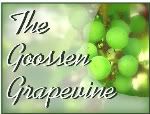We are first introduced to Stephen when the apostles informed the Church that is was not right that they neglect the Word of God in order to wait tables. Stephen was chosen as one of the seven to take up the work of serving the widows. He is described as a man who was both “full of the Spirit and wisdom” (vs. 3) and as one who was “full of faith...” (vs. 5). Stephen’s new ministry seems to have put him in contact with a great many people. And the mention of Stephen’s ability to perform “wonders and miracles (vs. 8) is very significant. It seems to imply that Stephen was, or at least functioned similarly to, an apostle. God had indeed purposed to make this man an apostle, in His own time, and in His own way. And – just like Peter – Stephen’s ministry incensed the Sanhedrin. So we find Stephen – just like Peter -- defending himself.
But Stephen’s defense before the Sanhedrin is really more of a sermon. It is the longest recorded sermon the Book of Acts. And Stephen’s sermon is Scriptural. One cannot imagine how any more Scripture could have been packed into one message. Stephen is not like so many contemporary preachers who begin with a Scripture text never again to return to it. His entire message was Scripture! And his conclusion was but an application of these Scriptures to his accusers. In spite of the fact that Stephen’s sermon had a very strong message of God’s judgment, it was motivated by a loving and gracious spirit. Yet the message was too much to bear. Just as they had done before, the Sanhedrin rejected God’s spokesman and they would do away with Stephen in an effort to do away with the message of Jesus.
The description of the crowd is one of near insanity. They were out of their minds. Logic and reason would have agreed with Stephen, for his message was merely a recitation of the Old Testament. But the Spirit of Christ was present; and the crowd would have none of Him “and they stoned Stephen…” (Acts 7:59). They drug him out of the city and stoned him, with the consent and assistance of Saul. Stephen, like his Savior, called upon God to receive his sprit. His last words, like those of Jesus, were words of compassion. He prayed for the forgiveness of those who had sinned by taking his life. The salvation of Saul, while it would be at a later time, was an answer to this prayer.
What an illustration of dying grace! We hear much about being “Spirit filled,” but we don’t speak of it in the context of death. Stephen’s death, because it was experience by a Spirit-filled man, is a model for all Christians. And there are more direct applications of this text to us. Just as Jerusalem was rushing towards its own destruction, so is our own world. The judgment of God is soon to fall on our world for the same reason that it fell upon Jerusalem – rejection of God’s Word. And finally, there is the lesson in how to use and interpret Scripture. Stephen’s message was drenched in Scripture. There was much of God’s thoughts and none of Stephen’s. Stephen had a grasp of the Scriptures, as a whole, and in large potions. May we imitate Stephen in his handling of the Word of God!
-Pastor Mark





No comments:
Post a Comment